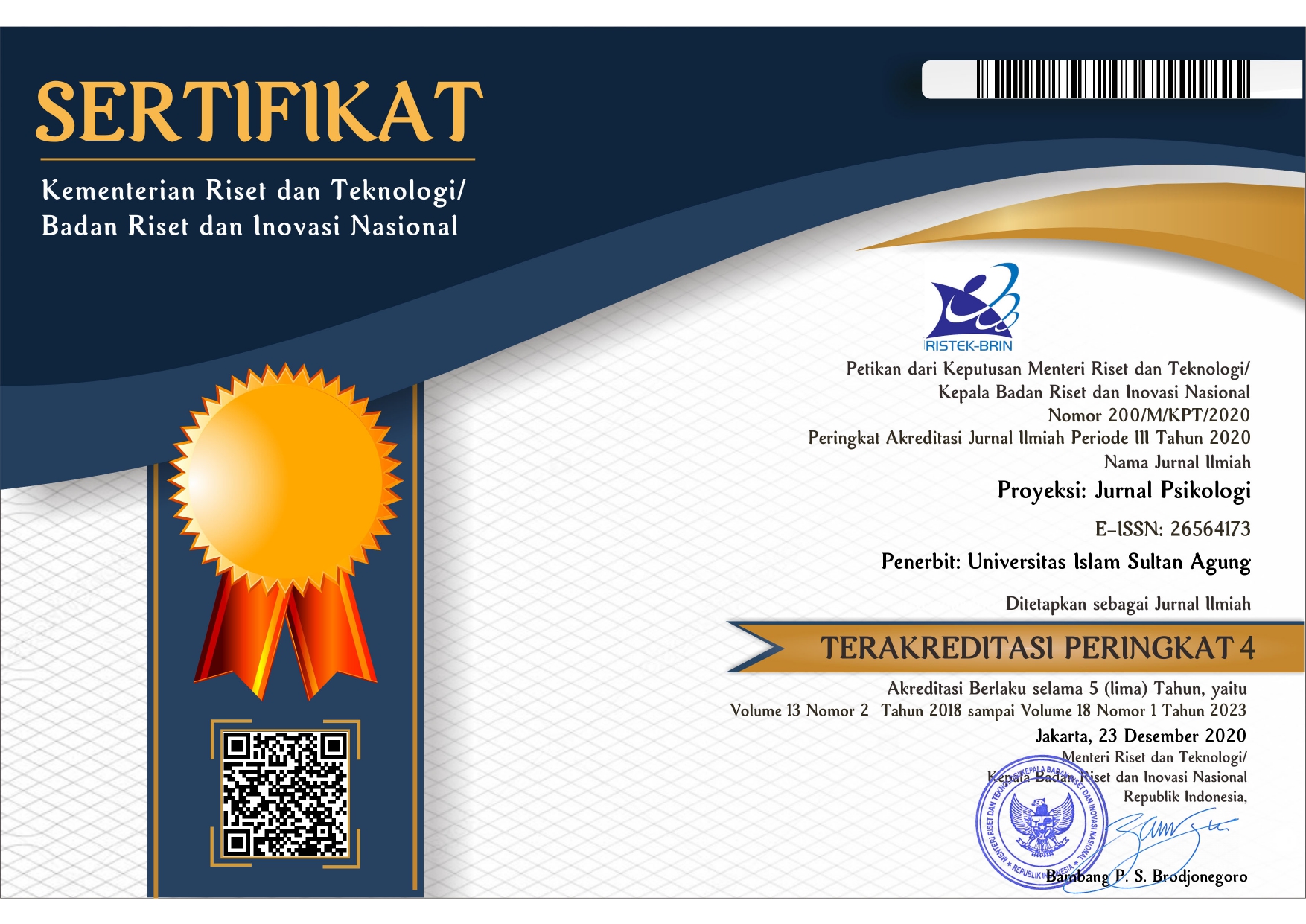DEPRESI PADA IBU DAN PENGARUHNYA DALAM PERILAKU PENGASUHAN
Abstract
Depresi pada ibu merupakan suatu kondisi mental ibu dengan karakteristik, yaitu kurangnya kehangatan, tidak spontan, tegang atau kaku ketika berinteraksi dengan anak. Hal ini dapat memengaruhi perilaku pengasuhan yang diberikan ibu pada anaknya. Kondisi ini dipengaruhi pula oleh faktor-faktor ekonomi, status pernikahan, dan karakteristik anak. Anak belajar bertingkah laku dan berekspresi emosi dari orangtuanya, khususnya ibunya. Penelitian ini bertujuan untuk memeroleh gambaran depresi pada ibu dan pengaruhnya dalam perilaku pengasuhan yang dilakukan pada anak. Penelitian ini merupakan studi kasus pada seorang ibu yang mengalami depresi. Pengumpulan data dilakukan dengan observasi, wawancara, dan menggunakan beberapa alat tes (grafis, BDI) untuk memeroleh gambaran kondisi subjek. Analisis deskriptif dilakukan untuk memeroleh gambaran perilaku pengasuhan yang dilakukan oleh ibu pada anaknya. Hasilnya menunjukkan bahwa ibu dengan kondisi depresi berdampak pada perilaku pengasuhan yang diberikan. Anak mengalami hambatan dalam perkembangan. Hambatan tersebut antara lain perkembangan fisik, afeksi, psikomotor, dan sosialnya. Perilaku pengasuhan yang dilakukan kurang optimal dan tidak efektif. Pengaruh negatif ini berlangsung secara timbal balik antara ibu dengan anak dan membutuhkan penanganan lebih lanjut.
Â
Kata Kunci: Depresi pada ibu, perilaku pengasuhan, anakKeywords
Full Text:
PDFReferences
Azar, S. T., & Weinzierl, B.S. (2005). Child maltreatment and childhood injury research: A cognitive behavioral research. Journal of Pediatric Psychology, 30(7), 598 – 614. Doi: 10.1093/jpepsy/jsi046.
Bettes, B. A. (1988). Maternal depression and motherese: Temporal and intonational features. Child Development, 59, (4), 1089-1096. DOI: 10.2307/1130275
Conrad, M. & Hammen, C. (1989). Role of maternal depression in perceptions of child maladjustment. Journal of Consulting and Clinical Psychology, 57 (5), 663-667. doi: 10.1037/0022-006X.57.5.663.
Coyne, J. C., Kessler, R. C., Margalit, T., Turnbull, J., Wortman, C. B., & Greden, J. F. (1987). Living with a depressed person. Journal of Consulting and Clinical Psychology, 55(3), 347-352. http://dx.doi.org/10.1037/0022-006X.55.3.347
Dickstein, S., St. Andre, M., Sameroff, A., Seifer, R., & Schiller, M. (1999). Maternal depression, family
functioning, and child outcomes: A narrative assessment. In B. Fiese, & A. Sameroff (Eds.), The stories that families tell: Narrative coherence, narrative interaction, and relationship beliefs (pp. 84 – 104). Monographs of the Society for Research in Child Development.
Dickstein, S., Seifer, R., Hayden, L. C., Schiller, M., Sameroff, A. J., Keitner, G., Miller, I., Rasmussen, S.,
Matzko, M., & Magee, K. D. (1998). Levels of family assessment: II. impact of maternal
psychopathology on family functioning. Journal of Family Psychology, 12(1), 23-40.
Downey, G., & Coyne, J. C. (1990). Children of depressed parents: An integrative review. Psychological Bulletin, 108(1), 50-76.
Essex, M. J., Klein, M. H., Cho, E., & Kalin, N. H. (2002). Maternal stress beginning in infancy may sensitize children to later stress exposure:
Effects on cortisol and behavior. Biological Psychiatry, 52(8), 776.
Field, T. (1992). Infants of depressed mothers. Development and Psychopathology, 4 (1992), 49-6. DOI: 10.1017/S0954579400005551.
Hwa-Froelich, D. A., Cook, C. A. L.,
& Flick, L. H. (2008). Maternal sensitivity and communication styles mothers with depression. Journal of Early Intervention, 31 (1), 44-66. Doi: 10.1177/1053815108324754. http://jei.sagepub.com
Lyons-Ruth, K., Connell, D. B., Grunebaum, H. U. and Botein, S. (1990), Infants at Social Risk: Maternal Depression and Family Support Services as Mediators of Infant Development and Security of Attachment. Child Development, 61: 85–98. doi:10.1111/j.1467-8624.1990.tb02762.x
Nevid, J. S., Rathus, S. A., & Geene, B. (2003). Psikologi Abnormal, Eds. Kelima, Jilid 1. Jakarta: Penerbit Erlangga.
Oyserman, D., Mowbray, C. T., Meares, P. A., & Firminger, K. B. (2000). Parenting among mothers with a serious mental illness. American Journal of Orthopsychiatry, 70(3), 296-315.
Slominsky, L. J. (2010). The effects of parental mental illness on children: Pathways to resilience from infancy to adulthood. Dissertation. Michigan University.
Snyder, C. R., & Lopes, S. J. (2007). Positive psychology: Practical exploration of human strength. London: Sage Publication.
Smith, D. E., & Ashiabi, G. S. (2007). Poverty and child outcomes: A focus on jamaican youth. Adolescence, 42, (168), 837 - 858. ProQuest Sociology.
Sundel, M., & Sundel, S. S. (2005). Behavior change in the human services: Behavioral and cognitive principles and application. USA: Sage Publication.
Zuckerman, B. S., & Beardslee, W. R. (1987). Maternal depression: A concern of pediatricians. Pediatrics, 79 (1), 110 – 117.
Surkan, P. J., Kennedy, C. E., Hurley, K. M., & Black, M. M. (2011). Maternal depression and early childhood growth in developing
countries: Systematic review and meta-analysis. Bull World Health Organ, 287, 607–615. doi: 10.2471/BLT.11.088187.
DOI: http://dx.doi.org/10.30659/jp.11.1.65-76
Refbacks
- There are currently no refbacks.

Proyeksi by http://jurnal.unissula.ac.id/index.php/proyeksi/ is licensed under a Creative Commons Attribution-ShareAlike 4.0 International License.

